‘Great distress’: Bangladesh bears brutal cost of climate crisis
Global warming devastating Bangladesh, particularly increased cyclones and floods that bring saltwater further inland.
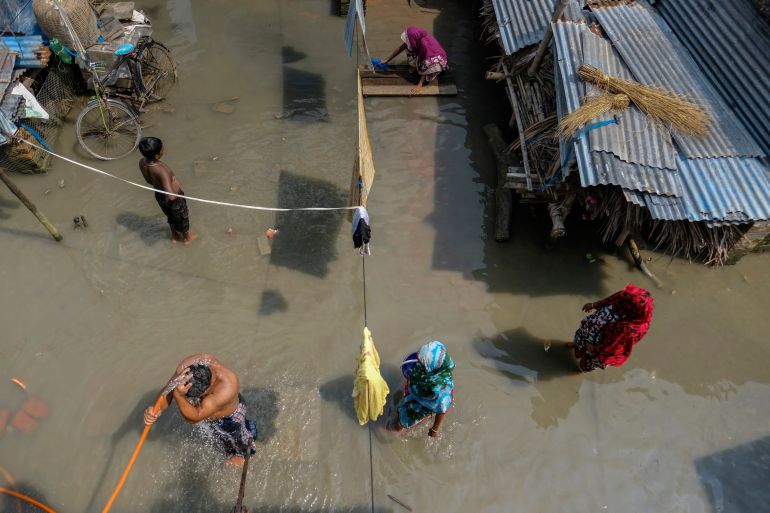
Experts say the effects of global warming are devastating Bangladesh and destroying the livelihoods of millions, particularly increased cyclones and flooding that brings saltwater further inland.
Bangladesh, a country of about 160 million, has historically contributed a fraction of the world’s emissions, and yet the low-lying delta nation is hard hit by climate change.
Keep reading
list of 4 itemsLife Below Sea Level: Bangladesh and our climate future
Lightning strikes in Bangladesh kill 16 at wedding party
Bangladesh: Rohingya photographers document deadly camp floods
Year after year floods break through the mud embankments, washing away crops and village homes.
Abdus Samad’s home in Protab Nagar village in the southwestern Shyamnagar region was inundated after the village embankment was destroyed by incessant tidal surges. He has already lost his farming land to water.
Samad’s grandsons helped him bring more soil to rebuild the structure and make it liveable. But the family knows it may not last long.
“We are living in great distress,” Samad told the Associated Press news agency.
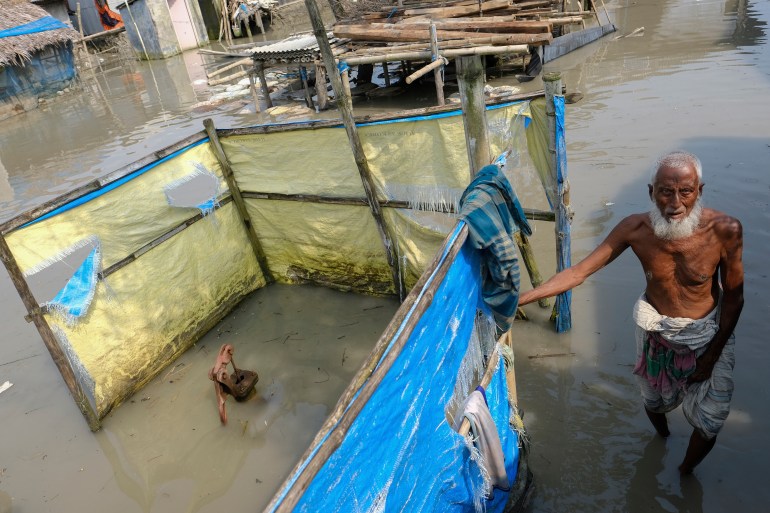
Encroaching seawater
In 1973, 833,000 hectares (3,216 square miles) of land were affected by the encroaching seawater, accelerated by more frequent cyclones and higher tides that have contaminated water supplies.
That is bigger than the state of Delaware in the United States.
This grew to 1.02 million hectares (3,938 square miles) in 2000, and 1.056 million hectares (4,077 square miles) in 2009, according to Bangladesh’s Soil Resources Development Institute. Salinity in soil has increased by 26 percent over the past 35 years.
A decade-old deal for rich countries to give poor nations $100bn each year to switch to clean energy and adapt to climate change has yet to be fulfilled. Even the money that is being provided – about $80bn in 2019 – is spread too thin to make much of a difference on the ground.
With representatives from the world gathering for the 26th UN Climate Change Conference, known as COP26, in Glasgow, Scotland, from October 31, experts say countries such as Bangladesh will press for more financial support to cope with global warming.
“We don’t have ample financial and technical capacity. So, to address all the issues we need external international support. And according to UN, in fact, the developed countries, the industrialised countries, they are bound to help us under the UN convention,” said Fazle Rabbi Sadeque Ahmed from Palli Karma-Sahayak Foundation (PKSF), a development organisation that works for sustainable poverty reduction in Bangladesh.
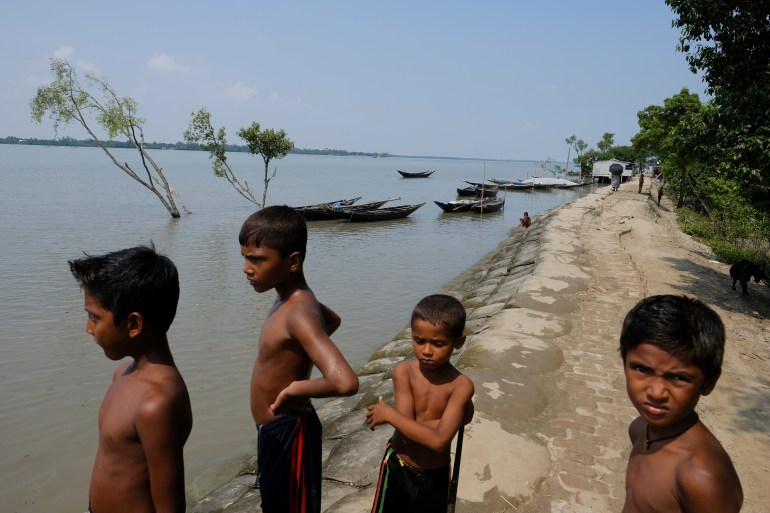
In Gabura, another village in the Bengal River delta, Nazma Khatun, 43, has been struggling to feed her two daughters.
Half of her meagre daily income – less than $3 from sewing and selling cloth – goes towards medicines for skin diseases that she says everyone in the coastal village of Gabura suffers from due to water and land contamination caused by rising sea levels.
Nazma said the land was once fertile and everyone grew vegetables in their back yard, relying on ponds, rivers and wells for drinking water.
She now blames saline water for all her suffering.
“My children can’t tolerate this water. They suffer from stomach problems, diarrhoea and dysentery. And they feel sick all the time,” she said.
Officials working in the region admit that paucity of funds was preventing the government from building new desalination plants that would convert salt water to freshwater.
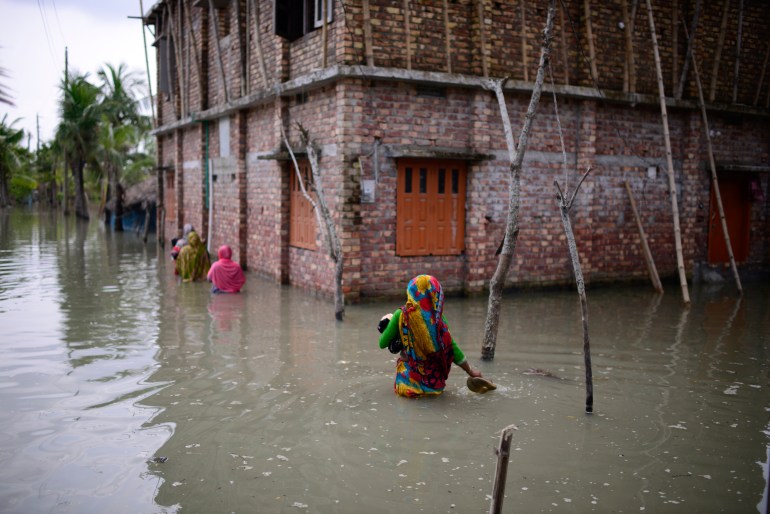
At Bonbibi Tola village, women from the surrounding area gather daily outside a hand-pumped well to collect water for cooking and drinking. Each woman walks up to 4km (2.4 miles) daily.
But even this will not last for long since freshwater becomes scarce in the delta in the summer months when the flow from Himalayan rivers decreases.
“During flood, everywhere there is water, but no water for drinking,’ said Ahmed from Palli Karma-Sahayak Foundation (PKSF).
“How could we overcome (this), we know – if we could make their embankment shelter properly if we can make enough desalination plants,” he said.
Cost of global warming
Environmental campaigners say a sea change is needed in the international debate on climate aid to ensure a steady increase in funding to poor, vulnerable nations from a variety of public and private sources.
Despite seeing its gross domestic product (GDP) rise from $6.2bn in 1972 to $305 bn in 2019, Bangladesh cannot pay for the cost of global warming on its own.
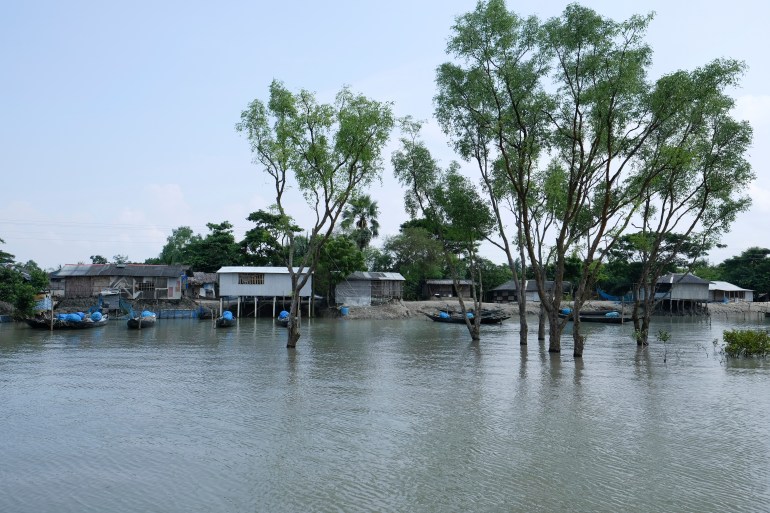
There are only six countries in the world that are hit harder by climate change from 2000 to 2019, according to the 2021 Climate Change Performance Index by nonprofit organisation Germanwatch.
In those years, Bangladesh lost 0.41 percent of its GDP due to climate change, and a single cyclone in 2019 caused losses of $8.1bn.
Villagers, who have lost their land and homes to floodwater, say they are forced to collect small donations “even from the helpless and poor who work as daily labourers” and repair the embankments themselves to prevent saltwater intrusion.
“We are doing it so we can live,” said Mohammed Abu Bakkar Fakir, whose village shop has been swallowed by tidal surges.
Experts say summits like that in Glasgow will need to address the thorny issue of compensating countries for the destruction caused by global warming, something large polluters have long resisted.
The 2015 Paris accord already contains a provision for this. Article 8 states that parties to the pact “recognise the importance of averting, minimising and addressing loss and damage associated with the adverse effects of climate change, including extreme weather events and slow onset events, and the role of sustainable development in reducing the risk of loss and damage”.
Rich countries such as the US are wary of such a move because it opens up the prospect of vast financial liabilities for their decades-long greenhouse gas emissions still lingering in the atmosphere.
But experts say addressing such issues in Glasgow will be critical.